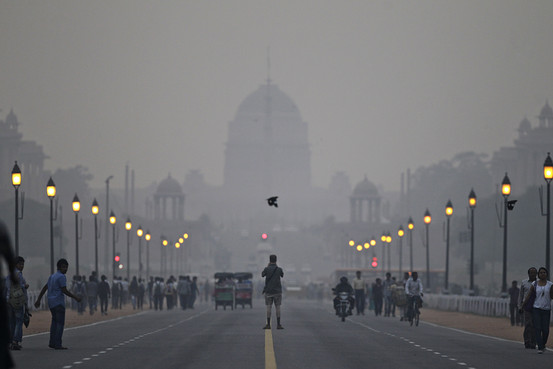Smog Capitals: Red Alert In Beijing, Business As Usual In New Delhi
Business as usual

NEW DELHI: China’s capital city Beijing has issued its first ever red alert for pollution, as a new blanket of smog is projected to descend upon the city. Meanwhile, New Delhi that has recorded even higher pollution levels than Beijing, goes about business as usual as the city debates an odd-even number plate system for a trial period of two weeks beginning January 1.
On Monday, Chinese officials mandated that half of the city’s private cars be off the road, instituting an odd-even number plate system in force. 30 percent of government vehicles have also been garaged. Other measures include stopping outdoor construction work, banning fireworks and barbeques, and encouraging schools to close. However, only some industrial plants will have to "implement measures to limit or stop production.”
"People should to the best of their ability reduce outdoor activities," Beijing’s environmental protection bureau said. "If you are engaging in outdoor activities you should wear a mask or take other protective measures."
Many residents, however, criticised the government’s seemingly lacklustre measures. “If you don't give us a day off school, what's the point of even talking about this?" asked one Chinese social media user, referring to the fact that schools were encouraged but not mandated to close.
Others said that the measures inconvenienced ordinary people without doing enough to tackle the real causes of Beijing’s pollution problem. "Those big trucks with excessive emissions, steel plants of excess capacity, and coal mines -- going after any one of those would be better than fixating on cars if you really want to fix the haze; that's useless,” said one user.
The red alert is the highest of Beijing's four-tiered, color-coded warning system that was instituted in 2013 following the adoption of an emergency response program for air pollution. Monday, however, is the first time a red alert was issued. It came after a thick grey haze shrouded the city with concentrations of PM2.5 -- the harmful microscopic particles that penetrate deep into the lungs -- recorded at 634 micrograms per cubic meter; the WHO’s recommended reading is just 25 micrograms per cubic metre.
Chinese social media commentators also pointed to the fact that no red alert was issued when the readings touched 634 a week ago. Monday’s high readings, in contrast, were 206 micrograms per cubic meter according to the US embassy, and 187 according to local authorities, with visibility significantly better than last week.
"If today is a red alert, then what was it I was seeing last week?" asked one user.
Others felt that it’s all the same. "I'm already indifferent, it's all a gas chamber anyway."
The comparison to a gas chamber is all too familiar for another capital city this side of the world, as India’s top court compared New Delhi to a gas chamber and mandated that the state government put in measures to tackle the problem. The AAP-led Delhi government responded with a proposal for an odd-even number plate system, facing a divided response from policymakers and the common people in Delhi alike.
Giving the state government a way out before the measure is even implemented, Delhi Chief Minister Arvind Kejriwal said that the government will withdraw the rule if the people of the city face any difficulties. "In principle, a decision has been taken. Many things are yet to be thrashed out... We will experiment with it for some time. Maybe, for 10 to 15 days. If there are too many problems, it will be stopped," the Chief Minister said.
The fact that Delhi’s inadequate public transport system will almost certainly not be able to accommodate the rise in the number of commuters means that people will face difficulty, and the odd-even number plate system may have been dealt its final blow before it even starts.
Further, just days after the Delhi government announced the measure, a Public Interest Litigation was filed challenging the whole concept in the Delhi High Court on Monday.
Another way out for the Delhi government is the insistence that all government cars -- political, military or judiciary -- will not be exempt from the measure, indicating that a powerful section of New Delhi’s residents may favour doing away with the radical proposal.
However, like Beijing, residents of Delhi have hit out at the government for not doing enough to reign in the problems, also pointing to the influx of trucks that pass through the capital city’s roads each night.
One thing is for certain, both Delhi and Beijing need to take drastic measures to curb pollution. The question still remains whether either of the governments concerned are willing to do so, or are the recent initiatives just piecemeal measures, as in Delhi the government has a way out by instituting a two-week trial system, and in Beijing the red alert seems to put curb on private individuals and not larger polluting activities as such.



